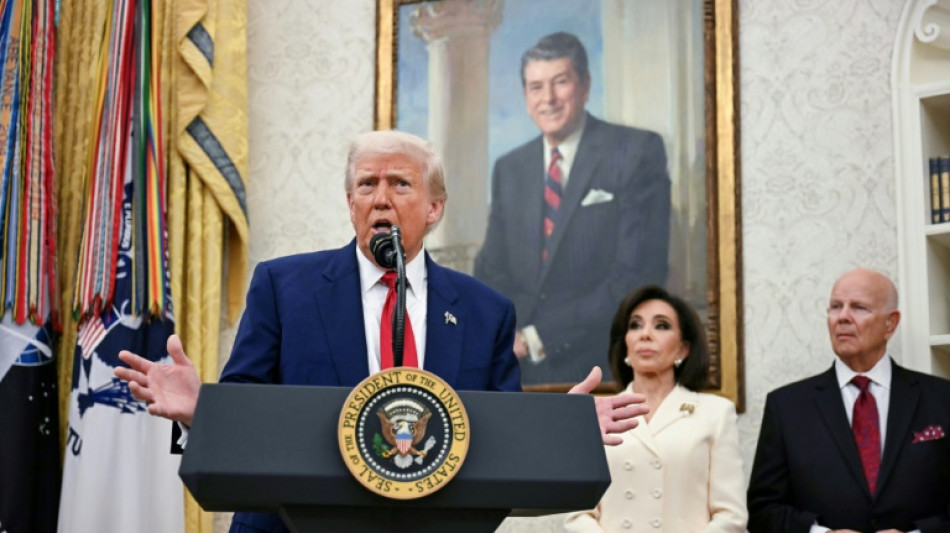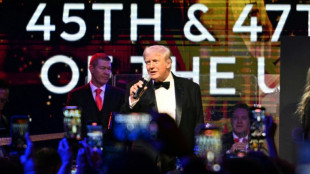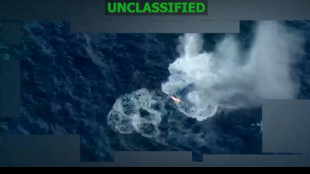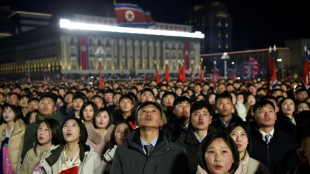
| SCS | 0.12% | 16.14 | $ | |
| RBGPF | -0.37% | 80.75 | $ | |
| CMSD | 0.09% | 23.15 | $ | |
| NGG | -0.54% | 77.35 | $ | |
| AZN | -0.63% | 91.93 | $ | |
| BCC | -0.26% | 73.6 | $ | |
| GSK | -0.53% | 49.04 | $ | |
| RIO | -0.61% | 80.03 | $ | |
| CMSC | -0.15% | 22.65 | $ | |
| BTI | 0.12% | 56.62 | $ | |
| BCE | 1.05% | 23.82 | $ | |
| RELX | -1.71% | 40.42 | $ | |
| BP | -0.06% | 34.73 | $ | |
| JRI | 0.22% | 13.61 | $ | |
| RYCEF | 0.13% | 15.51 | $ | |
| VOD | -0.15% | 13.21 | $ |
Trump says warned Netanyahu against striking Iran

US President Donald Trump said Wednesday he had told Israeli Prime Minister Benjamin Netanyahu to hold off from striking Iran as he voiced optimism about nuclear talks his administration is holding with Tehran.
Iran said that it may consider allowing Americans to inspect its facilities as part of the United Nations nuclear watchdog if a deal is reached.
Trump, asked if he had told Netanyahu in a call next week not to take any action that could disrupt the diplomacy, said: "Well, I'd like to be honest, yes I did."
Pressed on what he told the Israeli premier, Trump replied: "I just said I don't think it's appropriate, we're having very good discussions with them."
He added: "I told him this would be inappropriate to do right now because we're very close to a solution.
"I think they want to make a deal, and if we can make a deal, save a lot of lives."
Tehran and Washington have in recent weeks held five rounds of talks focused on the issue -- their highest-level contact since Trump in 2018 withdrew from a previous deal negotiated by former president Barack Obama.
Trump on a visit to Qatar earlier in May voiced optimism at reaching a new agreement with Iran that avoids military conflict.
Israel sees cleric-ruled Iran, which supports Hamas militants in Gaza, as its top enemy. Israel has repeatedly threatened strikes on its nuclear facilities, after pummelling Iranian air defenses in rare direct combat.
- 'Reconsider accepting Americans' -
Iran denies Western charges that it is seeking a nuclear weapon, insisting its program is solely for peaceful, civilian purposes.
Trump, withdrawing from the Obama-era deal in 2018, imposed sweeping sanctions that include pressuring all countries not to buy Iranian oil.
"Countries that were hostile to us and behaved unprincipledly over the years -- we have always tried not to accept inspectors from those countries," Iran's nuclear chief Mohammad Eslami told reporters, referring to staff from the International Atomic Energy Agency (IAEA).
Tehran "will reconsider accepting American inspectors through the agency" if "an agreement is reached, and Iran's demands are taken into account," he said.
President Masoud Pezeshkian, currently on an official visit to Oman, thanked the Gulf state for its mediation efforts between the longtime adversaries, which have had no formal diplomatic ties since 1979.
Iranian Foreign Minister and top negotiator Abbas Araghchi, who is accompanying Pezeshkian in Oman, said that "the date for the new round of negotiations will probably be clarified within the next few days."
While welcoming the negotiations, Iranian officials have repeatedly declared uranium enrichment "non-negotiable." Trump administration officials have publicly insisted that Iran not be allowed to enrich any uranium -- even at low levels for civilian purposes, as allowed under Obama's 2015 deal.
"The continuation of enrichment in Iran is an inseparable part of the country's nuclear industry and a fundamental principle for the Islamic Republic of Iran," Foreign Ministry spokesman Esmaeil Baqaei told reporters.
"Any proposal or initiative that contradicts this principle or undermines this right is unacceptable."
Iran currently enriches uranium up to 60 percent -- the highest level of any non-nuclear weapons state. That rate is still below the 90 percent threshold required for a nuclear weapon, but far above the 3.67 percent limit set under the 2015 deal.
S.Gorski--GL

 London
London

 Manchester
Manchester
 Glasgow
Glasgow
 Dublin
Dublin
 Belfast
Belfast
 Washington
Washington
 Denver
Denver
 Atlanta
Atlanta
 Dallas
Dallas
 Houston Texas
Houston Texas
 New Orleans
New Orleans
 El Paso
El Paso
 Phoenix
Phoenix
 Los Angeles
Los Angeles



